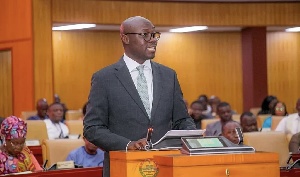- Home - News
- Elections 2024
- News Archive
- Crime & Punishment
- Politics
- Regional
- Editorial
- Health
- Ghanaians Abroad
- Tabloid
- Africa
- Religion
- Photo Archives
- Press Release
General News of Thursday, 5 June 2025
Source: www.ghanawebbers.com
Details of Energy Sector Levies (Amendment) Bill, 2025
Ghana’s energy sector is facing a critical situation. Years of debt and rising fuel costs have created an emergency. The current debt exceeds $3.1 billion, impacting the national electricity supply. Unmet obligations to Independent Power Producers (IPPs) and fuel suppliers add to this burden. If not addressed, these issues could lead to a severe power crisis.
To tackle this, the government is taking action to stabilize the power sector. The proposed Energy Sector Levies (Amendment) Bill, 2025 aims to revise the Energy Sector Shortfall and Debt Repayment Levy. This will help raise funds for settling debts and procuring liquid fuel for power generation.
The adjustments are designed to avoid increasing petrol and diesel prices. They will protect industries and households from further economic strain. The funds raised will be dedicated to stabilizing the power sector and preventing more debt accumulation.
This amendment is urgent for Ghana’s energy security. It aims to boost investor confidence in the sector and support sustainable growth. The following memorandum outlines the rationale behind this legislative change.
---
ENERGY SECTOR LEVIES (AMENDMENT) BILL, 2025
MEMORANDUM
The Bill aims to amend the Energy Sector Levies Act, 2025 (Act 1135). It seeks to increase the Energy Sector Shortfall and Debt Repayment Levy. This will generate revenue for paying energy sector shortfalls and reducing legacy debts.
Currently, the power sector poses significant economic risks for Ghana. If unaddressed, it could lead to major crises due to debt and inefficiencies.
As of March 2025, total energy sector debt stands at $3.1 billion. This includes money owed to independent power producers and fuel suppliers.
Non-payment of bills has drawn down guarantees from international institutions completely. The government now needs an additional $632 million to restore these guarantees.
Moreover, at least $3.7 billion is required to address overall energy sector indebtedness.
Over time, Ghana's electricity generation has shifted heavily towards thermal sources due to insufficient hydroelectric supply.
Liquid fuel costs for thermal plants are not included in current tariffs, leading to revenue shortfalls for procurement.
According to regulators, including these costs would raise electricity tariffs by over 50%. Such an increase would negatively impact households and industries significantly.
In 2025 alone, the government requires $1.2 billion just for liquid fuel procurement.
The power sector risks collapse if these financial shortfalls remain unresolved since fiscal policy cannot meet its needs.
To raise additional revenue for the power sector, an increase in the Energy Sector Shortfall and Debt Repayment Levy is proposed.
This adjustment can be absorbed by gains from a strong Cedi performance without raising petrol or diesel prices immediately after implementation.
The levy will provide dedicated funding for procuring liquid fuel since current tariffs do not cover these costs adequately.
Increasing this levy balances stable power supply with financial sustainability in the energy sector.
Thus, the Bill seeks amendments that enhance funding availability through increased levies on petroleum prices.











